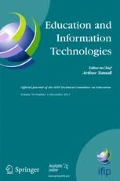Abstract
This article discusses the application of the peer review process as a pedagogical instrument for the promotion of written expression, collaborative work, critical thinking, and professional responsibility among Informatics and Engineering majors. The approach is introduced with a motivation, followed by a discussion about common principles of current learning paradigms and the peer review process. This work is being conducted in Brazil, where we intend to promote a learning paradigm shift through the application of peer review in education. A framework for this application is outlined, together with an account of results from experiences and a discussion about the skills that this approach exercises, especially with regard to widely accepted curricula and codes of ethics and professional conduct. Further research and development efforts are conjectured.
Similar content being viewed by others
References
ACM (1992) ACM Code of Ethics and Professional Conduct, adopted by the ACM Council on October 16th, 1992. [Available online at http://www.acm.org/constitution/code.html]
ACM and IEEE-CS (1997) Software Engineering Code of Ethics and Professional Practice (Version 5.2), Full Version, ACM/IEEE-CS Joint Task Force on Software Engineering Ethics and Professional Practices. [Available online at http://www.acm.org/serving/se/code.htm]
Bardin, L. (2001) L'analyse de Contenu, 10e edition. PUF, Paris, p. 296.
Bøhn, J. H. (ed) (1994) Computer-Aided Design I, ME 5604, Fall 1994, term papers. Virginia Tech, Blacksburg VA, p. 106.
Budny, D., Larkin, T., Callison, R., and Thomes, K. (2002) Using writing to meet the needs of freshmen. In Proceedings of the INTERTECH' 2002 – International Conference on Engineering and Technology Education, Santos, Brazil, March 17–20, p. 6, CD-ROM.
Chen, P. P. (1983) English sentence structure and entity-relationship diagram. Information Science, 29(2) (May), 127–149.
CNPq (2002) Programa Institucional de Bolsas de Iniciação Científica – PIBIC, CNPq – Brazilian National Research Council. [Available online at http://www.cnpq.br/areas/pibic/index.htm, accessed 2002.07.23]
CyberChair (2002) CyberChair: A Web-Based Paper Submission and Reviewing System. [Available online at http://www.cyberchair.org/, accessed 2002.07.23]
Harnad, S. (1996) Implementing peer review on the Net: Scientific quality control in scholarly electronic journals. In Scholarly Publishing: The Electronic Frontier, R. Peek and G. Newby (eds). MIT Press, Cambridge, MA, pp. 103–108.
IEEE-CS and ACM (2001) Computing Curricula 2001: Computer Science, Final Report, December 15, IEEE Computer Society and Association for Computing Machinery Joint Task Force on Computing Curricula. [Available online at http://www.computer.org/education/cc2001/final/cc2001.pdf]
Kern, V. M., Pernigotti, J. M., Calegaro, M. M., and Bento, M. (2002) Peer review in engineering education: Speeding up learning, looking for a paradigm shift. In Proceedings of the INTERTECH' 2002 – International Conference on Engineering and Technology Education, Santos, Brazil, March 17–20, p. 5, CD-ROM.
Moreira, D. A. and Silva, E. Q. (2002) A method to increase student interaction using student groups ad peer review over the Internet. In Proceedings of ICTEM 2002 – IFIP Working Group 3.2 Conference: Informatics Curricula, Teaching Methods, and Best Practices, Florianópolis-SC, Brazil, July 10–12, pp. 183–191.
Mulder, F. and van Weert, T. (eds) (2000) Building effective higher education informatics curricula in a situation of change. In IFIP/UNESCO Informatics Curriculum Framework 2000. UNESCO, Paris. [Available online at http://poe.netlab.csc.villanova.edu/ifip32/ICF2000.htm]
National Association of Colleges and Employers (2001) Job Outlook' 01 (online version). [Available online at http://www.jobweb.com]
National Institute of Standards and Technology (1993) Integration definition for information modeling (IDEF1X). Federal Information Processing Standards Publication 184. Gaithersburg, MD, December.
Nicol, D. M. (1996) Conference program management using the Internet. IEEE Computer, 29(3), 112–113.
OECD (2001) Programme for International Student Assessment. Executive Summary: Knowledge and Skills for Life, First Results from PISA 2000, Organisation for Economic Co-operation and Development, December 4. [Available online at http://www.pisa.oecd.org/Docs/Download/PISAExeSummary.pdf]
Piaget, J. (2001) The Psychology of Intelligence, First edition. Routledge. Saraiva, L. M. (1996) Diagnóstico Institucional Como Suporte de Investigação e Mudança Comportamental no Gerenciamento de Processos. Master's thesis. Universidade Federal de Santa Catarina, Programa de Pós-Graduação em Engenharia de Produção. [Abstract available online at http://teses.eps.ufsc.br]
SBC – Brazilian Computing Society (2002) Revista Eletrônica de Iniciação Científica. [Available online at http://www.sbc.org.br/reic/, accessed 2002.07.23]
Skinner, B. F. (1953) Science and Human Behavior. The Free Press, New York.
Smith, A. J. (1990) The task of the referee. IEEE Computer, 23(4), 46–51.
Sociedade Brasileira de Computação (1999) Currículo de Referência da SBC para Cursos de Graduação em Computação, versão 1999. [Available online at http://www.sbc.org.br/educacao] The Accreditation Board for Engineering and Technology (2001) Accreditation Policy and ProcedureManual, Effective for Evaluations During the 2002–2003 Accreditation Cycle. ABET, Inc., Baltimore, MD. November 3. [Available online at http://www.abet.org/images/2002-03APPM.pdf]
Vygotsky, L. S. (1978) Mind in Society: The Development of Higher Psychological Processes. Harvard University Press, Cambridge, MA.
Author information
Authors and Affiliations
Corresponding author
Rights and permissions
About this article
Cite this article
Kern, V.M., Saraiva, L.M. & dos Santos Pacheco, R.C. Peer Review in Education: Promoting Collaboration, Written Expression, Critical Thinking, and Professional Responsibility. Education and Information Technologies 8, 37–46 (2003). https://doi.org/10.1023/A:1023974224315
Issue Date:
DOI: https://doi.org/10.1023/A:1023974224315




